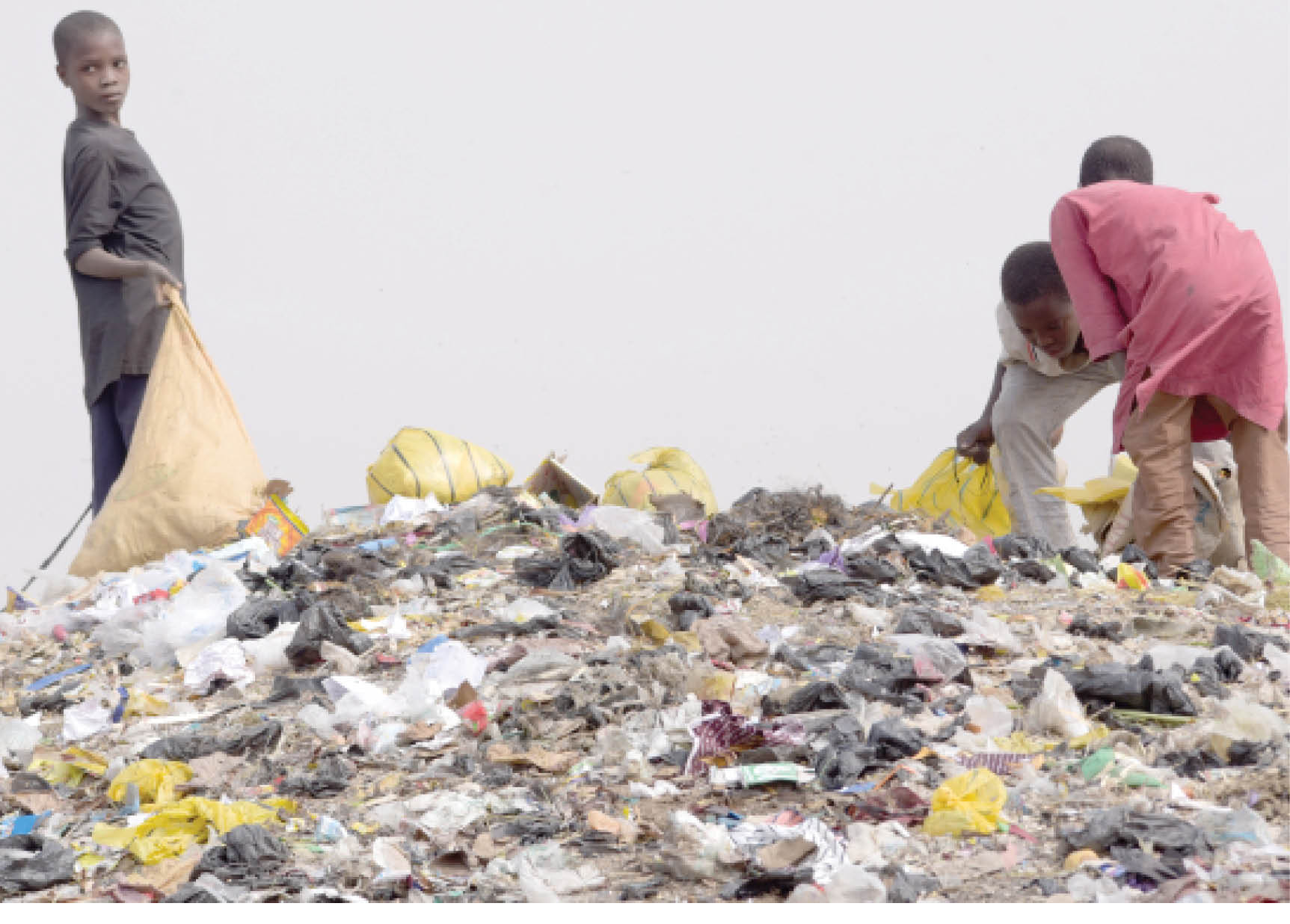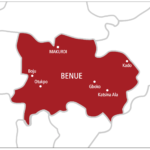At a dumpsite located along Court Road, Gyadi-Gyadi, Daily Trust reporter caught up with 12-year-old Auwal Mohammed. Auwal, an almajiri, says “Since the state government does not want to see us on the streets, this is the only option available to us. We glean through this refuse dump for anything that could be of use to us either as food or clothing. At the end of the day, some of us get clothing, foot wears and food from here.”
He said since the ban on street begging by the Kano State government, majority of them especially those below the age of 10 have been facing serious difficulty in feeding since they are not old enough to do menial jobs to get money for self-sustenance.
Auwal makes about N200 daily from iron and plastic materials he picks from the refuse dump.
Similarly, Usman Adamu, a resident of Mahuta in Katsina State, said since he came to Kano about two years ago, his major means of livelihood has been alms from well-spirited individuals. Following the ban on street begging, Usman says he is forced to resort to scavenging for survival. He makes at least N150 from the refuse dump every day.
The Kano State governor, Dr Abdullahi Umar Ganduje, on Tuesday made a pronouncement banning street begging in the state, saying any father whose child was caught begging in the state would face the wrath of the law, as government would not hesitate in prosecuting any erring parent.
However, shedding light on the statement, the Chief Press Secretary to the governor, Abba Anwar, said the general public should understand between policy statement and implementation of a policy, noting that “What happened at the Sani Abacha Indoor Stadium is nothing but a policy pronouncement.”
Anwar explained that the state governor, Dr Abdullahi Umar Ganduje, only made a policy statement regarding the ban on street begging, noting that programmes that would make smooth implementation of the policy were underway.
The issue of Almajiri Street begging has over the decades been a source of concern to successive governments in Kano State. Moreover, various attempts to address the issue have been adopted by different governments before the recent ban.
It would be recalled that a concept of Islamiyya Qur’anic and Tsangaya Education (IQTE) was introduced. It was a system where conventional education is integrated into the Islamiyya and Quránic school system with feeding support all in an attempt to reduce the Almajiri roaming the streets of Kano.
In 2016, the Kano State government made provision of N150m in the 2016 Budget to be expended in IQTE as part of the state’s commitment to the development of education in the state and as a measure to incorporate the Almajiri in 16 local governments of the state operating the IQTE schools.
According to the 2010 Ministerial Committee’s report on Madrasah, the Almajiri constitute the largest group of out-of-school children in Nigeria. And in order to reduce inequality and provide access to qualitative education to these segregated classes of children, the Federal Government set up a Committee on Implementation of Almajiri Education Programme and charged it with the responsibility of ensuring that these Almajirai are integrated into the Universal Basic Education Programme. This is without prejudice to their acquiring a sound mastery of Qur’anic Knowledge.
While some residents have commended the governor for taking the bold decision to tackle the ugly trend of street begging in the state, others not only criticized the move, but described it as political, saying successive government have also made similar pronouncement but failed at implementation.
However, following the mixed reaction expressed by different sectors in the state, Special Adviser to the Kano State Governor on Child Welfare and Women Mobilization, Hajiya Fatima Abdullahi Dala, issued a statement stating that the decision of the Kano State government was in good faith, without any prejudice or sentiment against any group of people, or class of individuals but in line with the commitment and unrelenting passion of the Kano State governor to uplift, safeguard and secure the lives and promote the welfare of the children in the state.
According to Malam Isa Usaini, an operator of Almajiri school in Hotoro area of Nassarawa Local Government Area, his school has about 26 students and none of these students was brought to the school with any food item. Some of the students came to the school with only one or two pairs of clothings.
He further revealed that his students still go out to beg for food as he and the children have no alternative. According to him, “Now that they have banned begging, I will allow them to go back to their parents. To be honest with you, I feel relieved and free to send them back to their parents with the strong reason that government has banned begging.”
However, one of his students, 9-year-old Umar Abdu Gofaru, told Daily Trust Saturday that he doesn’t want to return to his parents because life here is far better that life at his home.
Another teacher of an Almajiri school, Malam Haruna Ali, said no one can stop Almajiri from begging. He has about 41 students and says he will not return any of them, as stopping them from begging is like stopping them from studying about their religion.
On his part, the chairman of the Kano State chapter of the Council of Ulama, Sheikh Ibrahim Khaleel, viewed the decision of the Kano government on street begging as nothing but mere pronouncement.
Addressing a press conference, Sheikh Khaleel lamented that government was not serious about the issue of street begging, noting that “this is not a proper way of handling this issue because right steps have not been taken on the issue. Historical evidences on the ban of street begging are there to testify that the governor is just not serious about this issue.
“If we view the history of banning street begging since the time of Sir Ahmadu Bello, efforts to ban street begging were opposed by the Ulama who saw it as a way of keeping people away from Quranic or religious studies because the issue was at that time politicised.”
The scholar further recalled that during Governor Audu Bako’s administration, Alhaji Muhammadu Ibrahim, father of former Education minister Prof Ruqayyah, initiated good plans to curtail street begging, but it was also politicised.”
Subsequently, the military administration of Ndatsu Umaru had established a committee of prominent Islamic scholars made up of Sheikh Isah Waziri, Ibrahim Umar Kabo, Rabi Wali, among others, with a view to tackle the issue of street begging in the state.
“As the committee resumed work, Ndatsu was transferred from Kano State and the move died naturally. After the return of democracy, many governments have made efforts to address this problem but all were in vain due to some reasons.
Sheikh Ibrahim insisted that the right steps to ensure effective ban on street begging in the state have not been taken by the government, hence the failure.
“The right steps to follow include firstly, the real Quranic scholars who are really manning Tsangaya and Qur’anic schools in the state have to be identified. Thi is because there are street beggers who are really Quranic students, and there are those sent by their parents from the rural areas to come and beg in the urban areas. There are also physically challenged persons who engage in street begging because of their deformity. So, all these have to be identified first and categorized.”
“Secondly, the Hisbah used to make arrests and when they arrest them, they just keep them and cannot properly feed them. This is another loophole that needs to be addressed. Government should get prepared to take care of them in terms feeding, shelter and other needs. Thirdly, there is no way you can succeed in stopping street begging without collaborating with the neighbouring states because majority of these baggers come from neighbouring states.”
Sheikh Khaleel said for the ban to work effectively, there has to be a collaboration between the government, Quranic scholars and Tsangaya scholars. “You have to sit with them and understand why they engage in begging, get some statistics, know the total number of those engaged in street begging.”
He also said the government does not even consult with the Quranic teachers who see such efforts as a deliberate attempt at banning Quranic study.

“The truth is that there is need for a perfect plan for this to be achieved. To us at the Council of Ulama, the government cannot do it and is not serious about it. They are just doing it to appease others or they might have been accused of something from somewhere for which they simply organise a ceremony and that is all. That is our opinion.”
Daily Trust Saturday recalls that successive governments in the state have made several efforts in addressing the issue of street begging in the state but their efforts ended with little or no success.
Prominent among the efforts made by the previous government were the ones made by the administrations of Malam Ibrahim Shekarau and Dr Rabi’u Musa Kwankwaso.
The administration of Malam Shekarau in its efforts to address the issue of street begging, established the Tsangaya education programme with the sole aim of handling the affairs of Qur’anic and Tsangaya schools in the state.
Under this programme, the Shekarau-led administration achieved a lot in transforming the Qur’anic and Tsangaya system of education in the state within the span of eight years. Through the programme, the government constructed thousands of sheds for the Almajiri and provided foodstuff to thousands of Tsangaya and Qur’anic schools in the state.
The Shekarau-led government also introduced boarding Tsangaya schools in the state which were built at different locations across the state. These schools were special and meant for purely impacting Qur’anic knowledge.
Dr Bashir Shehu Galadanchi, the pioneer director general of the Tsangaya system of education under Shekarau’s administration told Daily Trust Saturday that government at that time achieved a lot in areas of public awareness and empowerment of students of Qur’anic school.
Galadanchi explained that “We did a lot in the area of awareness campaign among students and teachers of Qur’anic schools to first understand the need of transforming the Qur’anic system of education. We also did several awareness for the parents to understand the need for them to take care of their children and for the Alaramma to improve on the method of teaching the Qurani.
“We made series of interventions through construction of toilets, sheds, rooms, and classrooms according to the specifications of typical Qur’anic schools. We also trained students of Qur’anic schools in tailoring, calligraphy and many crafts in order to make them self-reliant.”
Consequently, the Kwankwaso-led administration came with its own style of handling street begging with a view to stopping it. For instance, the government apart from banning street begging, ordered for the immediate repatriation of all Almajiri that were not indigenes of Kano.
The government also introduced a N5,000 monthly stipend to each Kano indigene Almajiri with a view to discouraging begging. However, this minor incentive instead of reducing the number of street beggars, encouraged the influx of Almajiri from neighbouring states of Jigawa, Bauchi, Niger, Gombe, Katsina, Sokoto, Kebbi and Zamfara.
Dr Yunusa Adamu Dangwani, a former commissioner under Kwankwaso’s administration told Daily Trust Saturday that the administration had conducted a census of Islamiyyah, Qur’anic and Tsangaya schools in Kano, and the outcome of the exercise indicated that 2/3 of the total number of Almajiri in Kano were not indigenes of the state.
“I can vividly recall that Kwankwaso had once advised northern governors during one of their meetings on the need for the northern governors to team up and tackle the issue because it is not an issue that could be addressed by states individually. If the laudable programmes we introduced were sustained, the issue would have been addressed by now,” he concluded.
Apart from government’s effort in curbing street begging, some persons have ventured into assisting the state government to address the issue. For instance, Muhsin Mufti and Alaa Fadlallah are two individuals who decided to pull together their little resources to set up a free school for Almajiri at Yankaba Quarters in Nassarawa Local Government Area, under the auspices of Humanity for All Foundation.
According to Alaa Fadlallah, the sorry sight of innocent children who deserve parental care but are sent out at a tender age as Almajiri was what moved her to nurture the idea of assisting these little children in becoming useful to themselves and the society.
“Having been born in Kano, I have seen how much people are really suffering. I know the importance of education and how much it could bring you to realizing your dreams. So, immediately I finished my masters in the UK, we started this. We are funding this school mainly from our personal earnings, with support from family and friends,” she said.
Malam Iro Adam, of Ladanai, claimed that he had given shelter to about 8 Almajiri in his house because he noticed that in their school they lack where to sleep. According to him, he had sacrificed one of his outer rooms for these children to be sleeping in.
“The first time I saw these children standing outside waiting for the rain to stop so they can go back to sleep, I shed tears. But I can only give them shelter and that was what I did. Initially they were three but now eight of them are sleeping there,” he said.
However, in less than a week after government outlawed street begging by Almajiri children in a bid to ensure full compliance to its current free and compulsory basic education, the Almajiri have changed their tactics by focusing their attention on dumpsites to eke out a living.
These children now besiege refuse dumpsites to pick metals, plastics and other items for sale to recycling companies. In their hundreds, they hang around the dumpsites in wait for refuse disposal vans from various parts of the city and once one arrives, they swoop on the refuse in search of ‘useful items’ to keep body and soul together.




